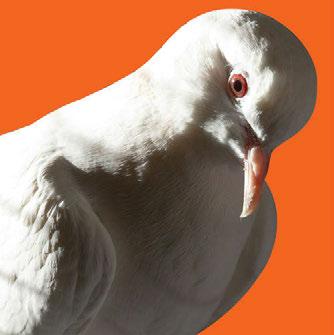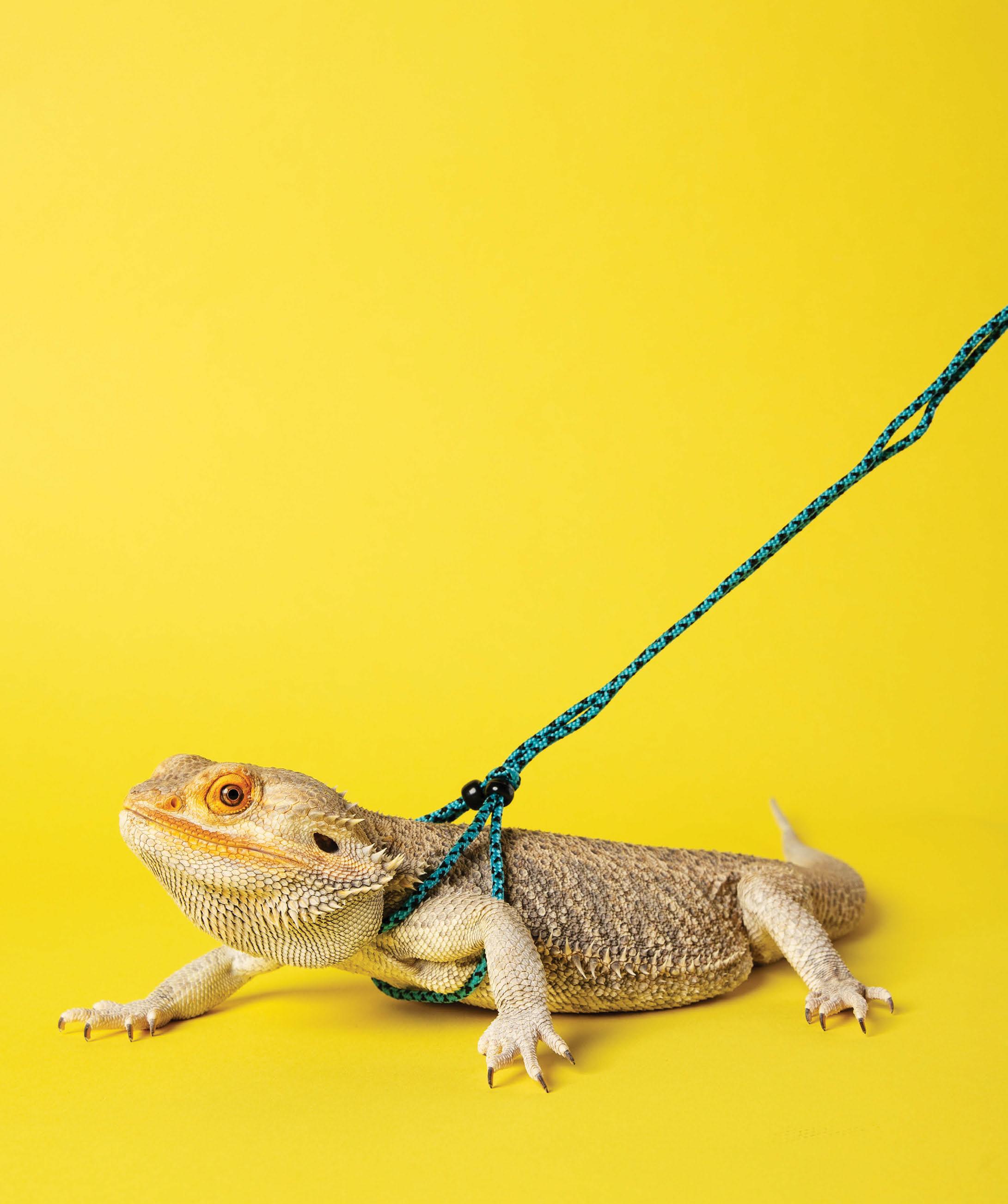
19 minute read
Cover Story: Pets! How to choose, where to adopt and more
So you think you want to adopt a pet. But where in the world do you start? Being a pet owner can be an enormous commitment and, depending on the pet you pick, a huge lifestyle change. So you’ll want to make sure you choose the creature that truly matches you.
To that end, we consulted with local pet experts to give you this custom guide to bringing a furry, feathered or scaly friend into your life. By C. Moon Reed
■ Do you live in a tiny apartment, or a house with a big yard? Make sure the animal’s needs match your space. And while you’re at it, check with your landlord or HOA to make sure there aren’t any restrictions. ■ How many hours will your pet be home alone? Dogs shouldn’t be left alone for more than eight hours. Cats, reptiles and fish offer more flexibility for the office-to-bar set. Swingshifters might consider adopting a rodent, many of which are nocturnal. ■ Do you have small children? Young kids are at the most danger of being bitten or scratched, in part because they’re most likely to treat furry pets like dolls. ■ What’s your budget? Pets incur cost beyond the price of adoption. There’s food, health care, grooming and boarding to consider, along with occasional unexpected expenses. Some animals are more costly than others. For example, bunnies are very expensive to maintain, according to Animal Foundation adoption manager Brenda Arceo. ■ What pets already live in your home? Make sure all your pets can live in harmony. When you go to adopt, it’s a good idea to bring your current pets along for a preliminary meet-and-greet. Fac t ors t o consider
■ What’s your physical activity level? Cats, fish and small mammals like hamsters or gerbils are good for less-active folks. Dogs generally require the most physical activity. In addition to being walked every day, they need cardio, which can usually be achieved with a rousing game of fetch. If you can’t keep up but still want a dog, opt for an older one, suggests Kelley Bollen, a certified animal behaviorist who consults with the Nevada SPCA. ■ Do you have time to train your pet or maintain its living environment? Several local pet rescue groups say that people largely surrender their pets for behavioral reasons, like peeing on the rug. These problems are often fixable with training, if owners have the time to do so.
Seemingly low-maintenance pets, like lizards and snakes, depend upon very specific living conditions to survive. Cages and aquariums need to be cleaned frequently, and feedings can be time-consuming and tricky. ■ Try a succulent first. There’s an old saying about the order of responsibility: first plants, then pets, then progeny. If you aren’t sure you’re ready for a pet, try keeping a cactus alive before taking the dive.
Adopt or buy?
So you’ve decided exactly what kind of pet you want. You’ve researched its needs, and you know it’s right for you. You’re most of the way there. But where do you find your future Fido? The Vegas Valley offers endless options, from breeders to rescue groups to shelters. Here’s how to proceed … ■ Start with your mouse.In the internet age, gone are the days of roaming the shelter until something catches your eye. With a few simple online searches (and maybe a little patience), it’s surprisingly easy to adopt the exact kind of pet you want. ■ It’s like online dating, but better. Nowadays, most shelters and rescue groups post their available pets online, like at animalfoundation.com. You can often search by species, breed, age, size, fur length, health needs and behavior. Petfinder.com, a website that aggregates available options at many of the local shelters and rescue groups, is a good place to start. W a nt something specific or unusua l? Do your research first. Make sure that the fancy and expensive cock-a-poo mix is truly preferable to the adorable poodle mix available at the shelter. But if only that super rare species or breed will do, you might need to go through a breeder.

W atch out for pupp y a nd kitten mills. Some bad actors care about profits over the well-being of animals, and to increase their profits, they’ll overbreed animals, keep them in unsanitary conditions and more. Before purchasing a pet, research the source to make sure it’s ethical. Trustworthy sellers should be happy to let you tour their facility, meet the animal’s parents, provide references and answer questions. If a Craigslist seller wants to meet you in a big-box parking lot to deliver your pet, that’s a red flag, says animal behaviorist Kelley Bollen. Ba by or a dult? We can all agree that there’s nothing cuter in the world than a baby animal. (Even baby skunks are adorable. Google it.) So naturally, folks tend to assume it’s most natural to adopt a puppy or kitten. But while adopting a young animal gives you complete control of its upbringing, it can be a lot of work. Like human babies, animal babies need extra care, socialization and potty training. A puppy, for example, can only hold its urine for a few hours at a time. “I’ve never had a puppy,” says Bollen. “Puppies are too much work, and I’m too busy.” When an animal professional says puppies require a ton effort, that’s saying something. Adopting an adult dog means skipping all the hassles of puppyhood and getting right to the fun stuff. Put another way, it’s less chewing and more cuddles … usually. MIND THE temperature If the y’re going to spend their lives chilling in your air-conditioned home, pretty much any dog breed can survive (by avoiding) the extreme desert heat. Some dogs do worse in the heat than others, however. Brachycephalic breeds, like pugs and bulldogs, have a harder time cooling off due to the bone structure of their faces. Additionally, dogs bred to live in northern climates—huskies, Saint Bernards, malamutes—have lots of adaptations to help them endure extreme cold. But those gorgeous, and very warm, double coats don’t do them any favors when it’s 100 degrees outside.
Bred in Mexico, Chihuahuas, on the other hand, have short hair and large ears that allow heat to escape. There are also a few rare breeds
of dogs from Egypt that do well in the heat, but they’re nearly impossible to find around here. Above all, remember this: No matter what breed of dog you get, don’t leave it outside in the heat of the summer. If you don’t want to be out there, your dog probably doesn’t want to, either.
One more warning: Even if you have a hardy cat (or some other fearless species), it’s not a good idea to let them face the elements on their own. Cars, disease and coyotes are perennial dangers to any animal, and some animals, like cats, can themselves pose a danger to the local wildlife.




THE ANIMAL FOUNDATION The Animal Foundation is the “highest volume single-site animal shelter in America,” according to its website. The facility treats and adopts out every type of animal, from cats to pigs to exotics. It contracts with Clark County, the City of Las Vegas and the City of North Las Vegas. animalfoundation.com.
CITY OF HENDERSON ANIMAL CARE AND CONTROL This group holds regular adoption events at PetSmart on 286 W. Lake Mead Parkway. cityofhenderson. com/animalcontrol.



HEAVEN CAN WAIT ANIMAL SOCIETY Since 2000, this nonprofi t has worked to prevent pet euthanasia through adoptions, education and spay and neutering. hcws.org.

A HOME 4 SPOT ANIMAL RESCUE This volunteer-based organization utilizes fostering to rehabilitate, and then adopt out, abandoned dogs. ahome4spot.com.


HOMEWARD BOUND CAT ADOPTIONS This no-kill shelter offers a free-roaming adoption center, which is less stressful for the cats. See below for details about its cool working cat adoption program. homewardboundcats.org.


LAS VEGAS VALLEY HUMANE SOCIETY This nonprofi t corporation saves about 1,000 animals a year. lvvhumane.org.


NEVADA SOCIETY FOR THE PREVENTION OF CRUELTY TO ANIMALS (NSPCA) This no-kill shelter has been saving animals since 1982. nevadaspca.org.



TORTOISE GROUP If you’d like to be a caretaker of a Nevada icon, you can rescue a desert tortoise through this nonprofi t rescue and advocacy group. tortoisegroup.org. TORTOISE GROUP If you’d like to be a caretaker of a Nevada icon, you can rescue a desert tortoise through this nonprofi t rescue and advocacy group. tortoisegroup.org.
MEET YOUR NEXT (SORTA) PET

Unlike dogs, who can’t survive in the wild and need to be re-homed or euthanized, stray cats have a few more options. The friendly ones can be adopted out as family pets. And the feral ones can participate in Trap, Neuter, Return programs, through which they’re sterilized and vaccinated before being released back to their points of origin.
But what about cats that don’t t into either category? Some are a little too wild to be cuddly but can’t stay in their communities for a variety of reasons (local laws, habitat destruction, etc).
Homeward Bound Cat Adoptions’ working cat program o ers a solution. Cats can be adopted out in groups of two or more as live-in pest control for a home or business. It’s a new take on the old tradition of a barn cat, with an added bonus: Adoption fees are waived and preliminary supplies are provided.
“These cats provide 24/7 natural, eco-friendly pest-control service in a mutually bene cial need—a home for the cats and feline friendship for the adopters,” Homeward Bound’s Carol Fox said in a press statement. “Most cats learn to trust and care for their adopter, so even though they may never curl up in your lap, they will show their appreciation in other ways.” –C. Moon Reed


Kiley Esprecion, dog coordinator for Heaven Can Wait, with Calypso, an 18-month-old husky-shepherd mix, outside the Florence McClure Women’s Correctional Center (Steve Marcus/Staff)
Dogs and female prisoners get a second chance Through Pups on Parole
Lerlene Roever always loved animals. Before prison, she had dogs, cats, fish, birds and even a turtle. So when Heaven Can Wait Animal Society brought a new program to the Nevada Department of Corrections in 2004, Roever was the first person to interview for a spot.
“That program is an absolute godsend for anyone interested in a new outlook on life,” says Roever, who participated as a handler for about seven years. While By C. Moon Reed serving time for a murder she says she didn’t commit, the then-inmate trained more than 100 homeless and/or abandoned dogs, preparing them to be family pets. “It’s a blessing and a half.”
So far, some 4,000 dogs and 1,000 humans have participated in Pups on Parole, according to Kiley Esprecion, dog coordinator for Heaven Can Wait. Handlers must make a yearlong commitment, learn the curriculum, stay out of trouble and maintain a full-time prison job. (The idea is to acclimate dogs to life on the outside with an owner who works all day.)
A day on the Pups on Parole circuit starts at 4:30 a.m., when handlers wake up to care for their dogs and take them on a 30-minute-minimum morning walk. “It’s very rigorous, and it’s a lot of hard work,” Roever says. “We’re walking the dogs in all weather.”
Before heading to work, handlers make sure everything’s tidy and the pups are set for the day. “We lived in such small quarters with two people and sometimes two dogs in a room with all your belongings, you’d have to make sure that things were put up,” Roever says. After work, handlers repeat the morning process, but with extra time devoted to playing and training. They address behavioral issues and teach dogs basic obedience: sit, stay, come, heel and down. If dogs aren’t immediately adopted, handlers teach them more complicated commands, like hand gestures, agility work and tricks. Esprecion says an ironic favorite is “hit the wall,” where the dogs pretend to ready themselves for a police pat down.
Roever, who was released in 2019 after 26 years in prison, went on to work at a pet store. She also has a rescue dog of her own, a miniature pinscher mix named Twix.
Roever says that most female inmates are survivors, either of abuse, sexual assault or other serious situations, and that Pups on Parole helps them heal. The dogs enter the program “just as broken and abused as many of us were,” and then the handlers rehabilitate them and send them off to new homes. “To see the changes in them and to experience their unconditional love is just transformative,” Roever says. “We say all the time, while we’re saving their lives, they’re saving ours.”
To adopt a dog that’s been trained through the Pups on Parole program in partnership with the Heaven Can Wait Animal Society, visit hcws.org.
OTHER SPECIES TO CONSIDER
There’s a world of pet options out there beyond cats and dogs. (Just be aware that exotic pets require as much if not more care than traditional ones.) (Just be aware that exotic pets require as much if not more care than traditional ones.)
SMALL RODENTS Parents who aren’t ready to get their kids dogs or cats often opt for a gerbil, hamster, mouse or rat. Just remember that small rodents, especially rats, are very smart and need lots of mental stimulation to be happy. Also, cleaning their cages isn’t fun. FISH A simple goldfi sh can be a great low-maintenance pet, and a giant aquarium can be a decorative showstopper … albeit a high-maintenance and expensive one. REPTILES They require a ton of research and care, but they can be very rewarding … in a coldblooded way.
BIRDS Start with a small bird like a cockatiel or parakeet. Just know that birds are smart, curious, highly social and very long-lived. BIRDS Start with a small bird like a cockatiel or parakeet. Just know that birds are smart, curious, highly social and very long-lived. 2.27.20 LVW COVER STORY 37
PIGS There’s no such thing as a “micro pig,” explains Brenda Arceo, adoptions manager for the Animal Foundation. She says many people buy baby piglets, only to watch them grow into 100-plus-pound creatures. If you want a big pig, go for it. If you want a tiny pig, maybe get a dog. PIGS There’s no such thing as a “micro pig,” explains Brenda Arceo, adoptions manager for the Animal Foundation. She says many people buy baby piglets, only to watch them grow into 100-plus-pound creatures. If you want a big pig, go for it. If you want a tiny pig, maybe get a dog.

BARNYARD ANIMALS You can adopt chickens, goats and more from the Animal Foundation. They’ll need space and care, but hey, free eggs! BARNYARD ANIMALS You can adopt chickens, goats and more from the Animal Foundation. They’ll need space and care, but hey, free eggs!

HORSES If you’ve always dreamed of a horse and have the resources to own one, you can bid on a saddle-trained wild horse from the Northern Nevada Correctional Center. Visit blm.gov for more information. HORSES If you’ve always dreamed of a horse and have the resources to own one, you can bid on a saddle-trained wild horse from the Northern Nevada Correctional Center. Visit blm.gov for more information.
WHAT ELSE CAN YOU KEEP AS A PET IN SOUTHERN NEVADA?
Before you get your heart set on a pet hippopotamus, fi nd out if it’s legal where you live. (Spoiler alert: It’s not.) We consulted the rules for Clark County, but Southern Nevada jurisdictions can vary, so check with yours.
















PERMIT REQUIRED Clark County requires an exotic animal permit to own any of these: primates (like a monkey); big cats (like a bobcat); wolves (or wolf hybrids); badgers; jackals; giraffes; zebras; marine mammals (like a dolphin or sea lion); anteaters; armadillos; reptiles 12 or more feet long; marsupials (except for sugar gliders). PERMIT REQUIRED Clark County requires an exotic animal permit to own any of these: primates (like a monkey); big cats (like a bobcat); wolves (or wolf hybrids); badgers; jackals; giraffes; zebras; marine mammals (like a dolphin or sea lion); anteaters; armadillos; reptiles 12 or more feet long; marsupials (except for sugar gliders).



NOT ALLOWED Clark County bans “inherently dangerous exotic or wild animals” that could pose a danger to the general public. So don’t even try to buy a bear, alligator, puma, cheetah, elephant, hippopotamus, gorilla, chimpanzee, hyena, cobra, rattlesnake or Komodo dragon. The ordinance notes that the human species is an exception to the ban against the superfamily hominoidea (no offense, orangutans).
A few of our favorite pet-friendly dining Spots
By Genevie Durano
Moe, a French Bulldog (left), and Baxter, a Jack Russell Terrier, enjoy a meal at Lazy Dog. (Wade Vandervort/Staff)

BRUNCHING Lazy Dog (Downtown Summerlin and Town Square) is the standard bearer for dog patios. Both locations offer ample space and special menus for your pup. If Downtown’s more your jam, Triple George Grill (201 N. 3rd St.) has classic American fare that never disappoints, and neither does its outdoor space, which offers prime people- and dog-watching. If you have a more active pet, fuel up at Mt. Charleston Lodge (5375 Kyle Canyon Road) with its stunning vistas, then take pup for a hike after.
happy hour Big D og’s Brewing Company (4543 N. Rancho Drive) is tops for handcrafted microbrews and a good place for lazy weekend afternoons. Shakespeare’s Grille & Pub (790 Coronado Center Drive) is a beloved Henderson joint offering more than 100 draft and bottled beers. And Grape Street Cafe (Downtown Summerlin) is an elegant spot for a tipple, with signature cocktails and wines by the glass or the bottle.
COFFEE Plenty of local java joints feature patios for those dog day afternoons. Sunrise Coffee House (3130 E. Sunset Road), the original Mothership Coffee location, has pourovers and handcrafted espressos, as well as vegan and vegetarian food options. The Boca Park location of Sambalatte (750 S. Rampart Blvd. #9) is a good respite in a busy shopping center. And should your pet happen to have insomnia, Madhouse Coffee (8470 W. Desert Inn Road) is open 24 hours a day year-round.

CENTRAL & SOUTH VALLEY Dog Park at Sunset Park 2601 E. Sunset Road Southern Highlands Dog Park 0500 S. Jones Blvd. Fire Station Dog Park 3776 Odessa Falls Ave. The Hydrant Club (paid members-only play space and dog daycare), 109 N. 9th St.
SUMMERLIN & WEST VALLEY Desert Breeze Dog Park 8275 Spring Mountain Road Woofter Family Park, 1600 Rock Springs Drive Barkin Basin Park 7351 W. Alexander Road Police Memorial Park 3250 Metro Academy Way
NORTH VALLEY Craig Ranch Regional Park (features three dog parks) 628 W. Craig Road Kellogg Zaher Sports Complex Dog Park 7901 W. Washington Ave. Centennial Hills Park 7101 N. Buffalo Drive Winding Trails Park 7250 N. Fort Apache Road
EAST VALLEY Clark County Dog Fancier’s Park 5800 E. Flamingo Road Justice Myron E. Leavitt & Jaycee Community Park 2100 E. St. Louis Ave Molasky Family Park 1065 E. Twain Ave.
HENDERSON Bark Park at Heritage Park 350 S. Racetrack Road Paseo Vista Park 2505 Paseo Verde Parkway Cactus Wren Park 2900 Ivanpah Drive Equestrian Park South 1298 Equestrian Drive
P A L A C E S T A T I O N





Now proudly featuring recliners! 2411 W Sahara Ave • REGmovies.com


Frontier Dining






